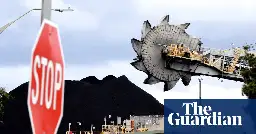NSW push to stop climate protesters livestreaming on Facebook labelled ‘profoundly anti-democratic’
NSW push to stop climate protesters livestreaming on Facebook labelled ‘profoundly anti-democratic’
Premier Chris Minns claims climate activists such as Blockade Australia are endangering lives by streaming protest actions

Civil liberties advocates have lashed the New South Wales Labor government’s attempts to stop climate activists from livestreaming protests on Facebook.
Members of Blockade Australia staged and streamed protests across the country this week, including along a train line that services the Newcastle coal port.
The premier, Chris Minns, announced via the Daily Telegraph on Thursday that he would request a meeting with the social media giant, alongside police, to see what they can do to “stop the broadcast of illegal acts”.
“Their business model relies on social media to broadcast their protest,” he said of the Blockade Australia protesters.
“These thrill demonstrators are putting lives at risk – both their own and those of emergency service and police.
“I don’t want to see a situation where there’s a death broadcast on social media.”
The opposition supported the idea, with leader and former attorney general, Mark Speakman, saying it would help deprive the protesters of attention.
“We all have a right to protest, but other people have rights as well … all those rights have to be balanced,” he said.
But independent crossbench MP Alex Greenwich said it was a “deeply concerning” development, noting the importance of protest in democracies.
“I strongly oppose those protest laws that were rushed through the parliament last year. Freedom to protest is such a fundamental right that we really need to be protecting,” he said.
The chair of Digital Rights Watch, Lizzie O’Shea, said the comments were something that she would “expect to hear from the People’s Republic of China, not from a Labor NSW premier.
“People use live streaming for very important accountability scenarios or for accountability measures, including, for example, filming violence by police all around the world. And the idea that live streaming should be prohibited when it comes to protest is profoundly anti-democratic,” she said.
O’Shea said it wasn’t clear how it could be implemented technically, or how Meta would be able to distinguish between what protests are allowed to be streamed and what would not be allowed.
Guardian Australia understands the premier has yet to formally approach Meta to discuss the idea, and had not communicated directly with the tech giant about the plan since the announcement.
The president of the NSW Council for Civil Liberties, Josh Pallas, accused the premier of attempting to shut down freedom of speech and freedom of expression.
“Trying to shut down protesters’ use of Facebook is yet another example of the way that freedom of public assembly in NSW is being attacked by successive governments,” he said.
He said interference from governments in the way protesters used Facebook would set a “precedent where private enterprises are called on to acquiesce to the will of the government of the day in stifling speech”.
The previous government introduced new laws to deal with protesters that could see them slapped with $22,000 fines or put behind bars for two years for types of protest that included disrupting or obstructing traffic on a major bridge, tunnel or road.
Minns supported the laws when in opposition.
Human Rights Watch researcher Sophie McNeill said peaceful protest was an important human right.
“You don’t respond to the climate emergency by trying to censor people protesting about it!” she said on social media.